Everyday Opportunities for Inclusion and Collaboration Nithya Ruff, Comcast Erik Riedel, Works Together @nithyaruff + @er1p
A presentation at Open Source Summit Europe in October 2017 in Prague, Czechia by erik riedel

Everyday Opportunities for Inclusion and Collaboration Nithya Ruff, Comcast Erik Riedel, Works Together @nithyaruff + @er1p

Introduction @nithyaruff (she/her) @er1p (he/him)

Create MANY informal and inclusive opportunities for people to interact.

https:/www.nytimes.com/2017/07/01/upshot/members-of-the-opposite-sex-at-work-gender-study.htm

Outcomes • The article prompted us to share our experiences • What’s needed is MORE opportunities for trusted networking, mentoring, and meetings • Create MORE positive interactions EVERY DAY • Improve the culture AND the technical output AND the business results

Relationships Are a Part of Work Always Important Sometimes Difficult Often Exclusive Build Trust

MORE Opportunity, MORE Interactions Mix It Up Community Activity Public Spaces Daylight, Outside Remote Teams Volunteer Events External Speakers

Employees Attend ONE networking event each MONTH Bosses Organize TWO networking events each MONTH

Manager Employee Interactions

Flexibility

Employees ASK for things Bosses Give permission to NOT ask permission quote thanks to @TheAmyCode - photo thanks to @EddieColla

Example Team Values ∙ ∙ ∙ ∙ ∙ ∙ ∙ ∙ We value attitude over aptitude; NO genius JERKS allowed. We value INDIVIDUALS & interactions over process & tools. We value diversity of opinion over group consensus. We recognize that the best idea can come from anyone; effective leaders create ways to solicit & consider them. We value leadership through service over fighting turf wars; we get ahead by HELPING others succeed. We value actively and HUMBLY seeking and appreciating honest FEEDBACK over preserving our egos. We are good listeners, and LISTEN twice as much as we talk. (2 ears, 1 mouth) We value hiring for quality and diversity over hiring fast.

Employees Bosses KNOW the culture, ask questions Create TRUST, norms

Peer to Peer Interactions

Peer to Peer - Meetings The Quiet Ones Interruptions Acknowledgement Taking Notes Ownership

Employees Participate, take credit, don’t show off Bosses Listen, ask for participation, acknowledge contributions

Peer to Peer - Conferences Hallway Track Evening Events Speak Learn Meet Mentors Volunteer

Employees Take Advantage of OUTSIDE Engagements It REALLY is worth it, in so many ways Bosses Provide OPPORTUNITIES for outside engagements Return-on-investment is so HIGH

Create MANY informal and inclusive opportunities for people to interact.
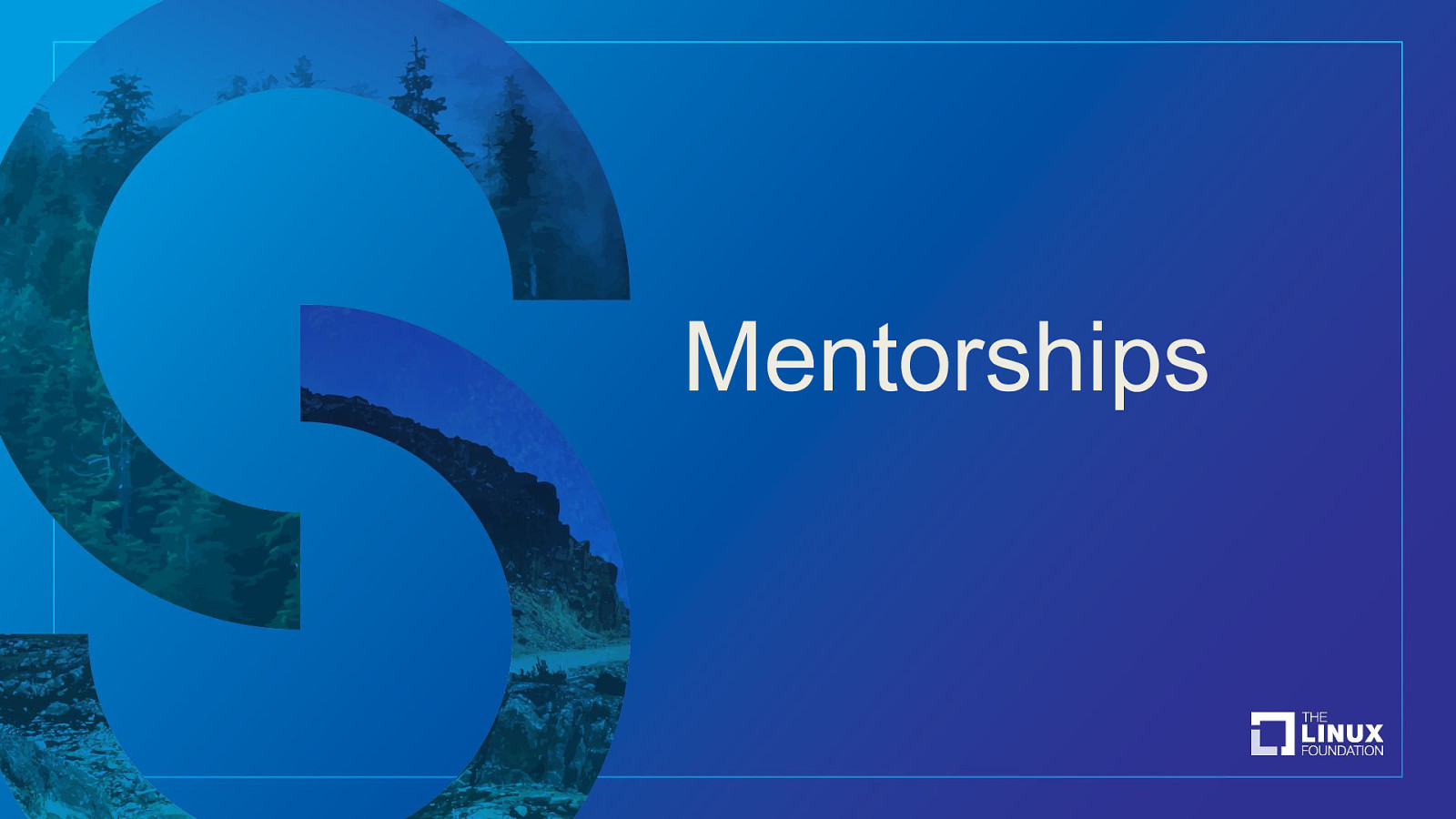
Mentorships
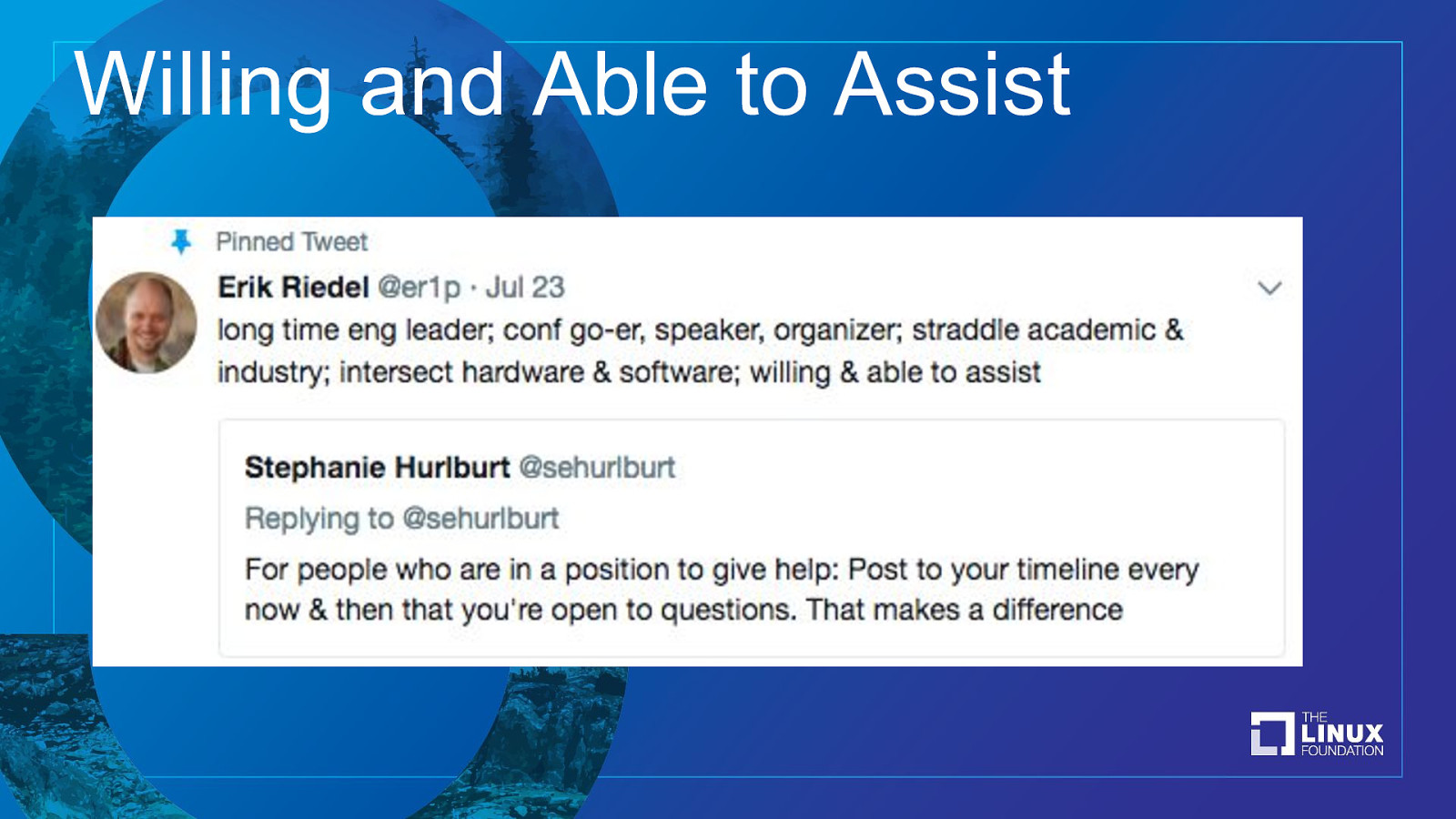
Willing and Able to Assist

Do You Have a Minute? Create many INFORMAL opportunities to have access to key people • Don’t be afraid to reach out & share progress or get input • Bosses can make themselves more accessible
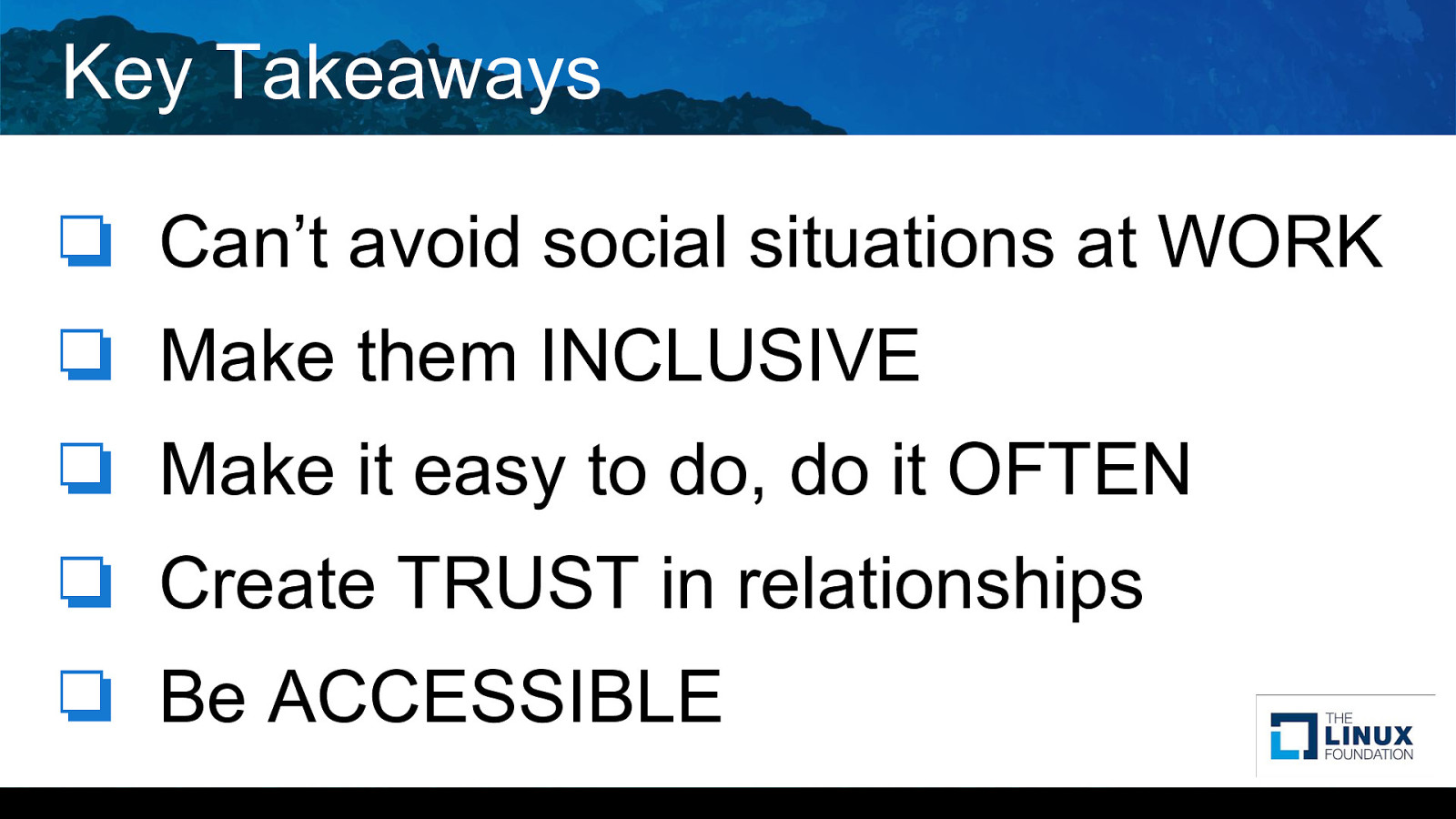
Key Takeaways ❏ Can’t avoid social situations at WORK ❏ Make them INCLUSIVE ❏ Make it easy to do, do it OFTEN ❏ Create TRUST in relationships ❏ Be ACCESSIBLE
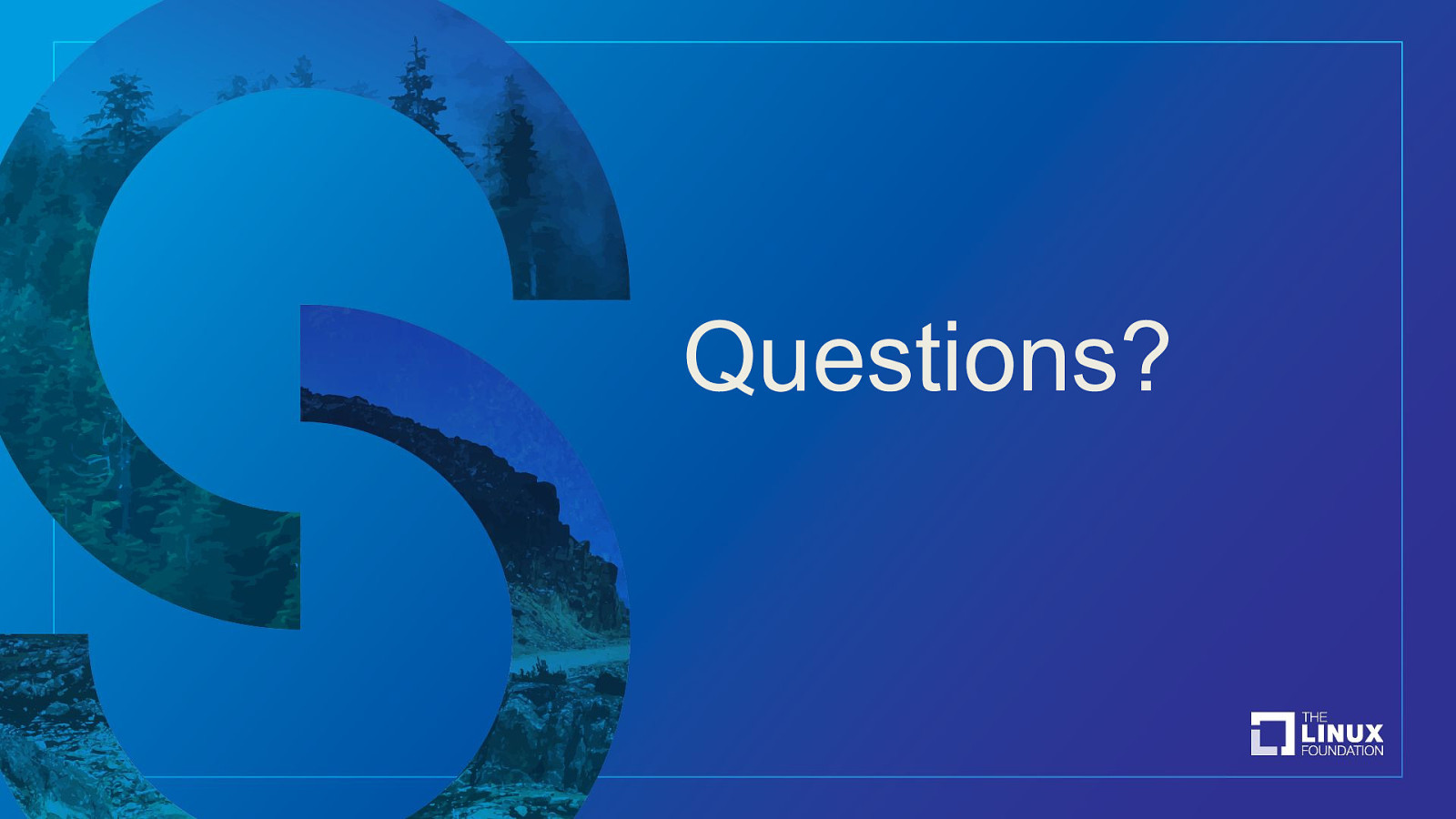
Questions?
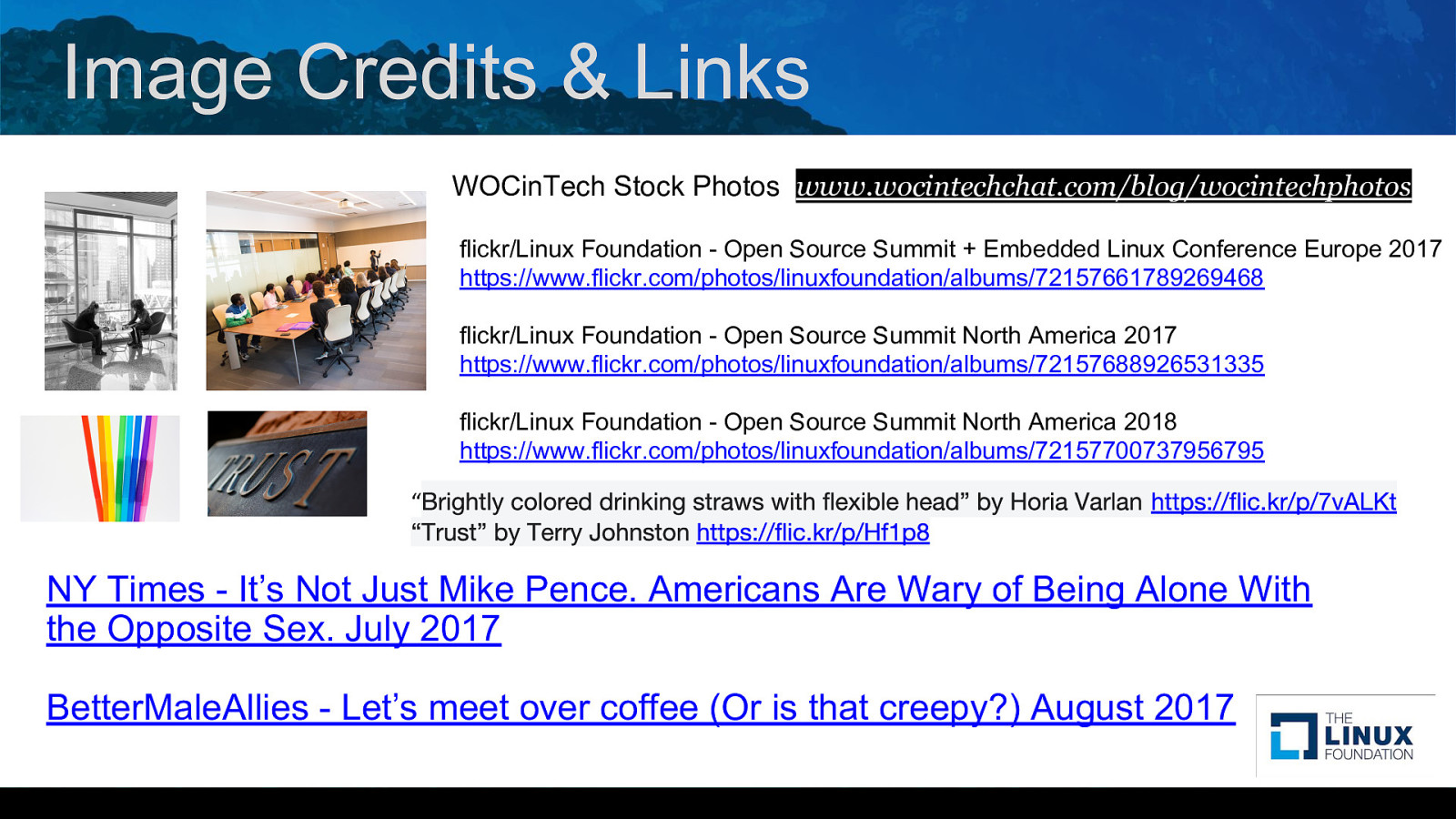
Image Credits & Links WOCinTech Stock Photos www.wocintechchat.com/blog/wocintechphotos flickr/Linux Foundation - Open Source Summit + Embedded Linux Conference Europe 2017 https://www.flickr.com/photos/linuxfoundation/albums/72157661789269468 flickr/Linux Foundation - Open Source Summit North America 2017 https://www.flickr.com/photos/linuxfoundation/albums/72157688926531335 flickr/Linux Foundation - Open Source Summit North America 2018 https://www.flickr.com/photos/linuxfoundation/albums/72157700737956795 “ NY Times - It’s Not Just Mike Pence. Americans Are Wary of Being Alone With the Opposite Sex. July 2017 BetterMaleAllies - Let’s meet over coffee (Or is that creepy?) August 2017
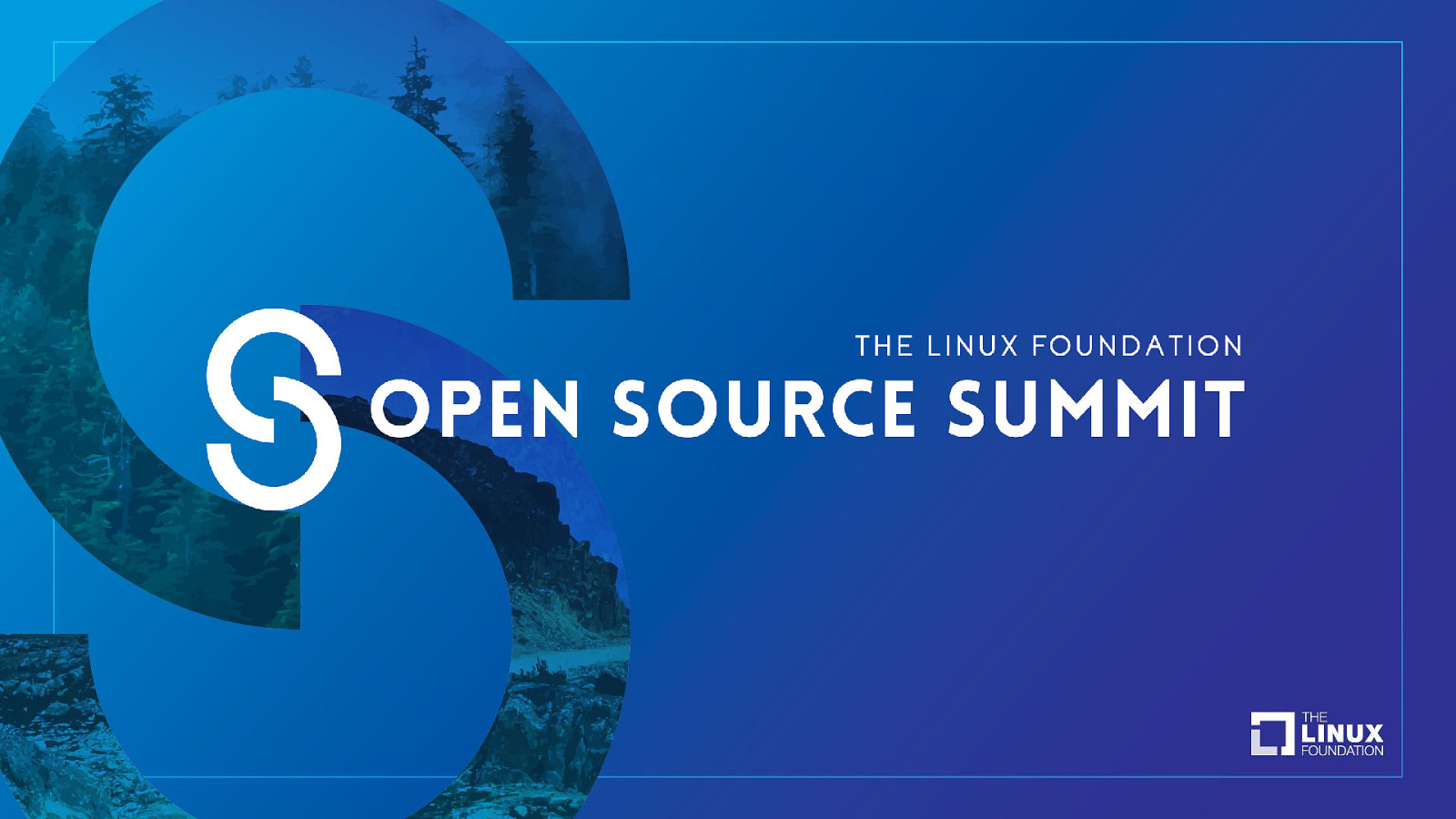
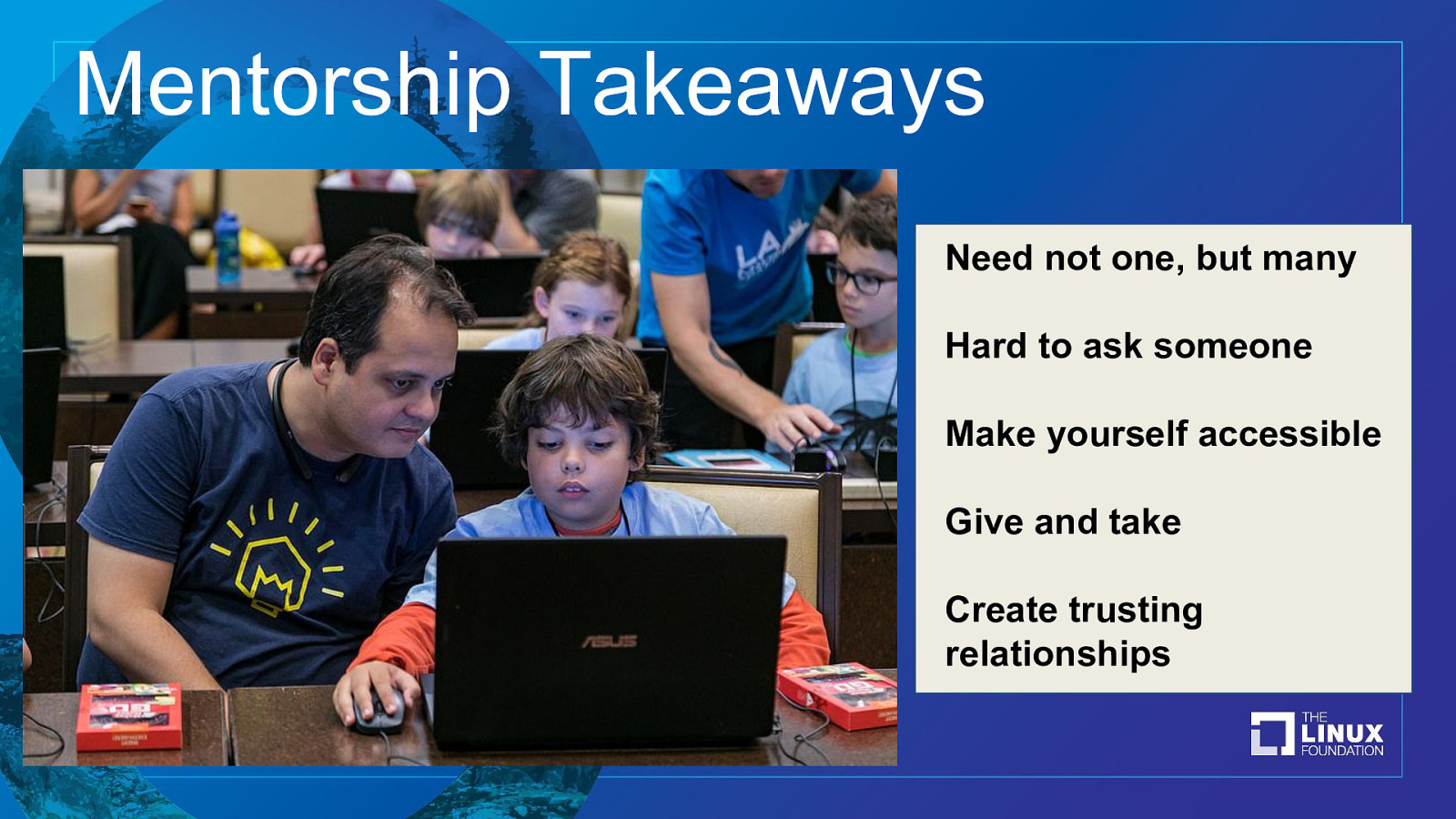
Mentorship Takeaways Need not one, but many Hard to ask someone Make yourself accessible Give and take Create trusting relationships
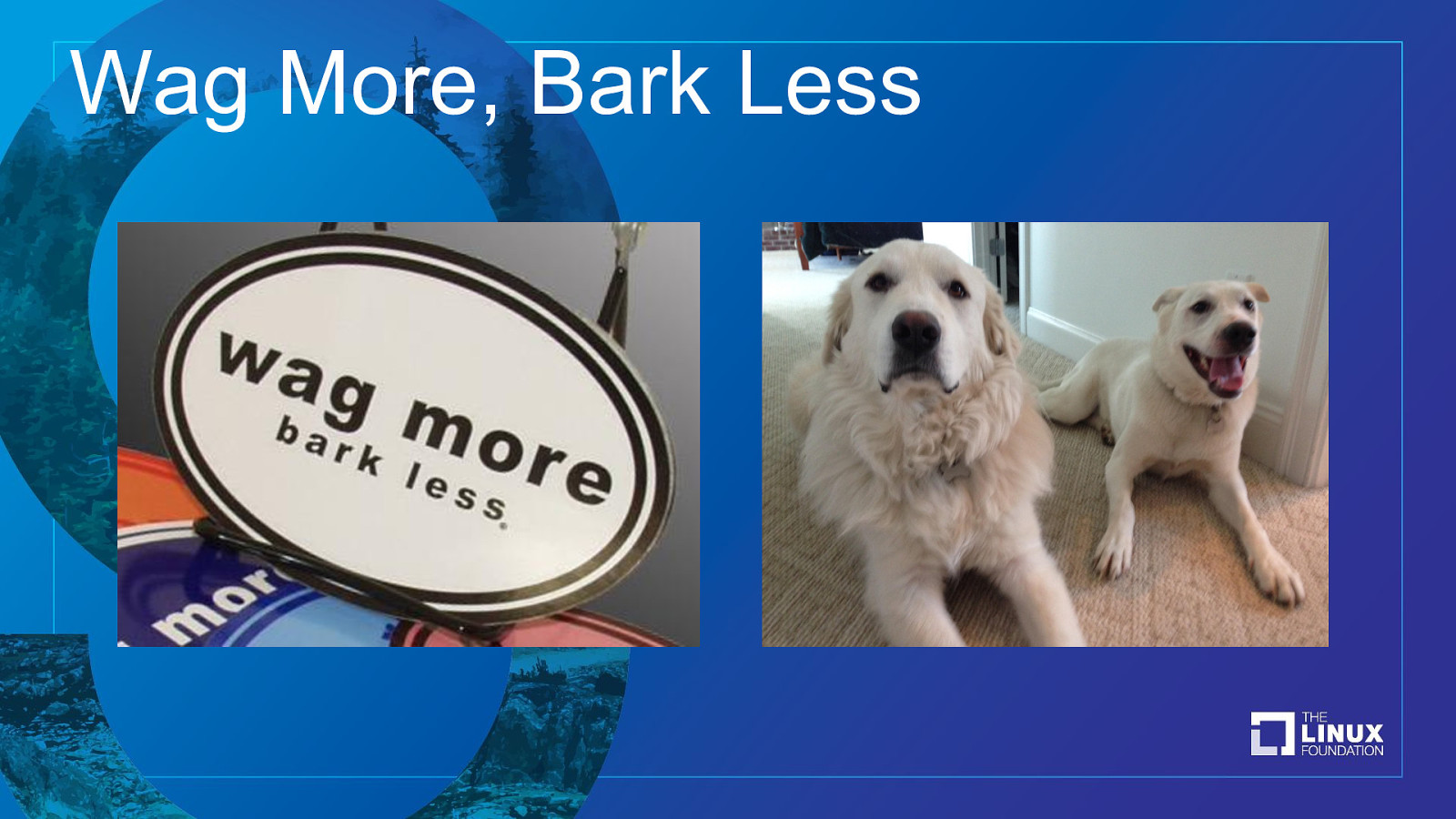
Wag More, Bark Less
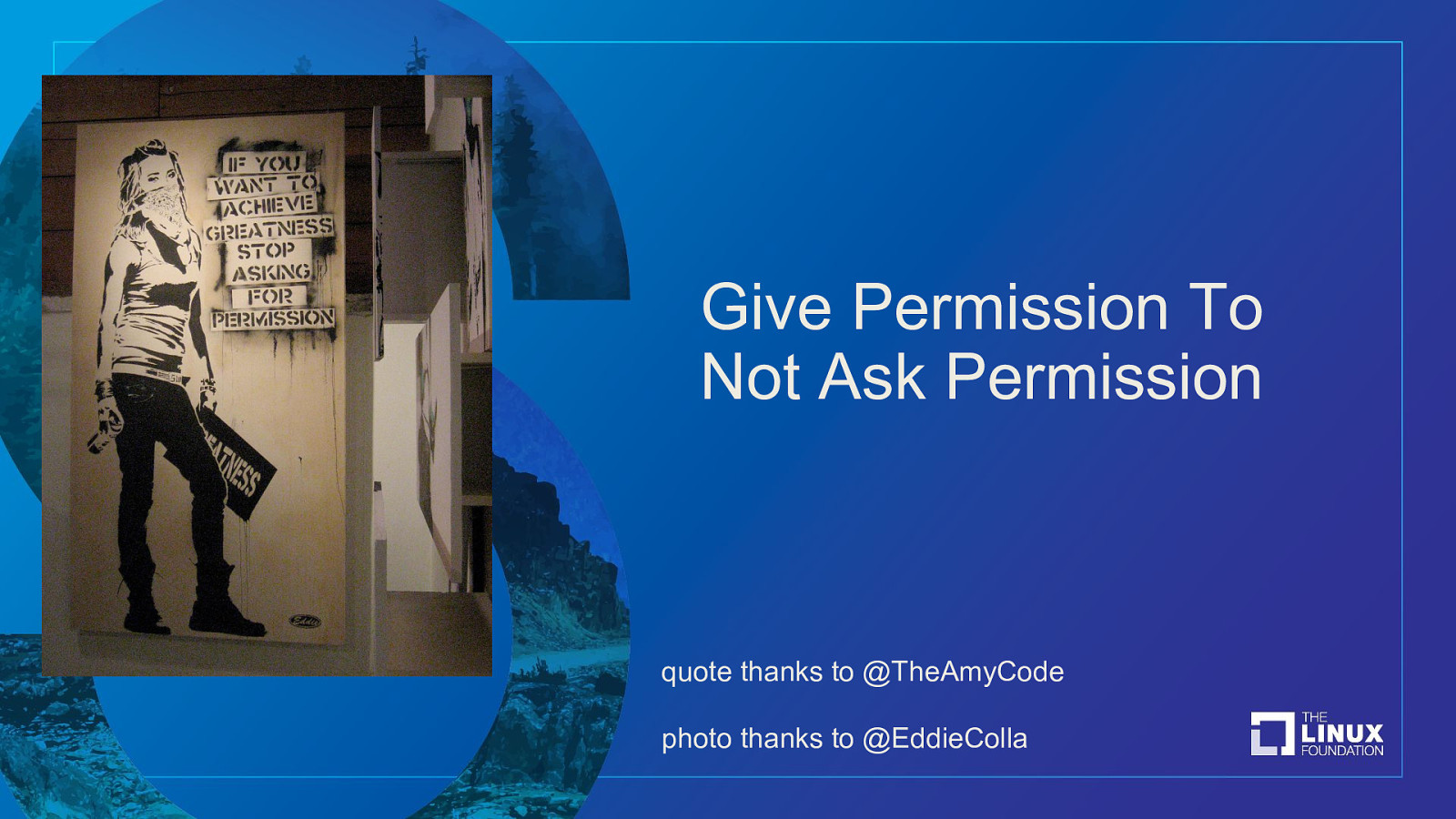
Give Permission To Not Ask Permission quote thanks to @TheAmyCode photo thanks to @EddieColla
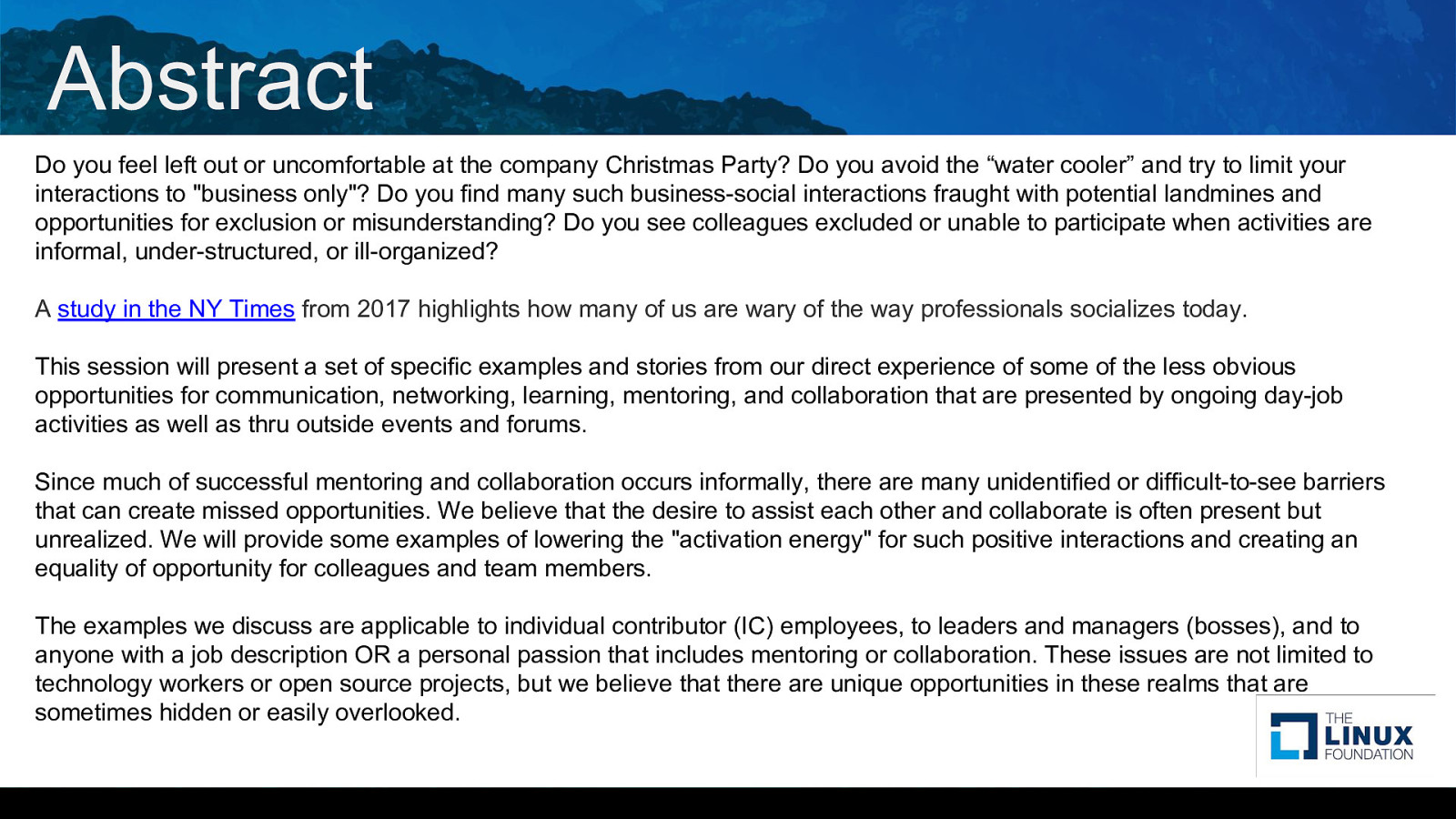
Abstract Do you feel left out or uncomfortable at the company Christmas Party? Do you avoid the “water cooler” and try to limit your interactions to “business only”? Do you find many such business-social interactions fraught with potential landmines and opportunities for exclusion or misunderstanding? Do you see colleagues excluded or unable to participate when activities are informal, under-structured, or ill-organized? A study in the NY Times from 2017 highlights how many of us are wary of the way professionals socializes today. This session will present a set of specific examples and stories from our direct experience of some of the less obvious opportunities for communication, networking, learning, mentoring, and collaboration that are presented by ongoing day-job activities as well as thru outside events and forums. Since much of successful mentoring and collaboration occurs informally, there are many unidentified or difficult-to-see barriers that can create missed opportunities. We believe that the desire to assist each other and collaborate is often present but unrealized. We will provide some examples of lowering the “activation energy” for such positive interactions and creating an equality of opportunity for colleagues and team members. The examples we discuss are applicable to individual contributor (IC) employees, to leaders and managers (bosses), and to anyone with a job description OR a personal passion that includes mentoring or collaboration. These issues are not limited to technology workers or open source projects, but we believe that there are unique opportunities in these realms that are sometimes hidden or easily overlooked.
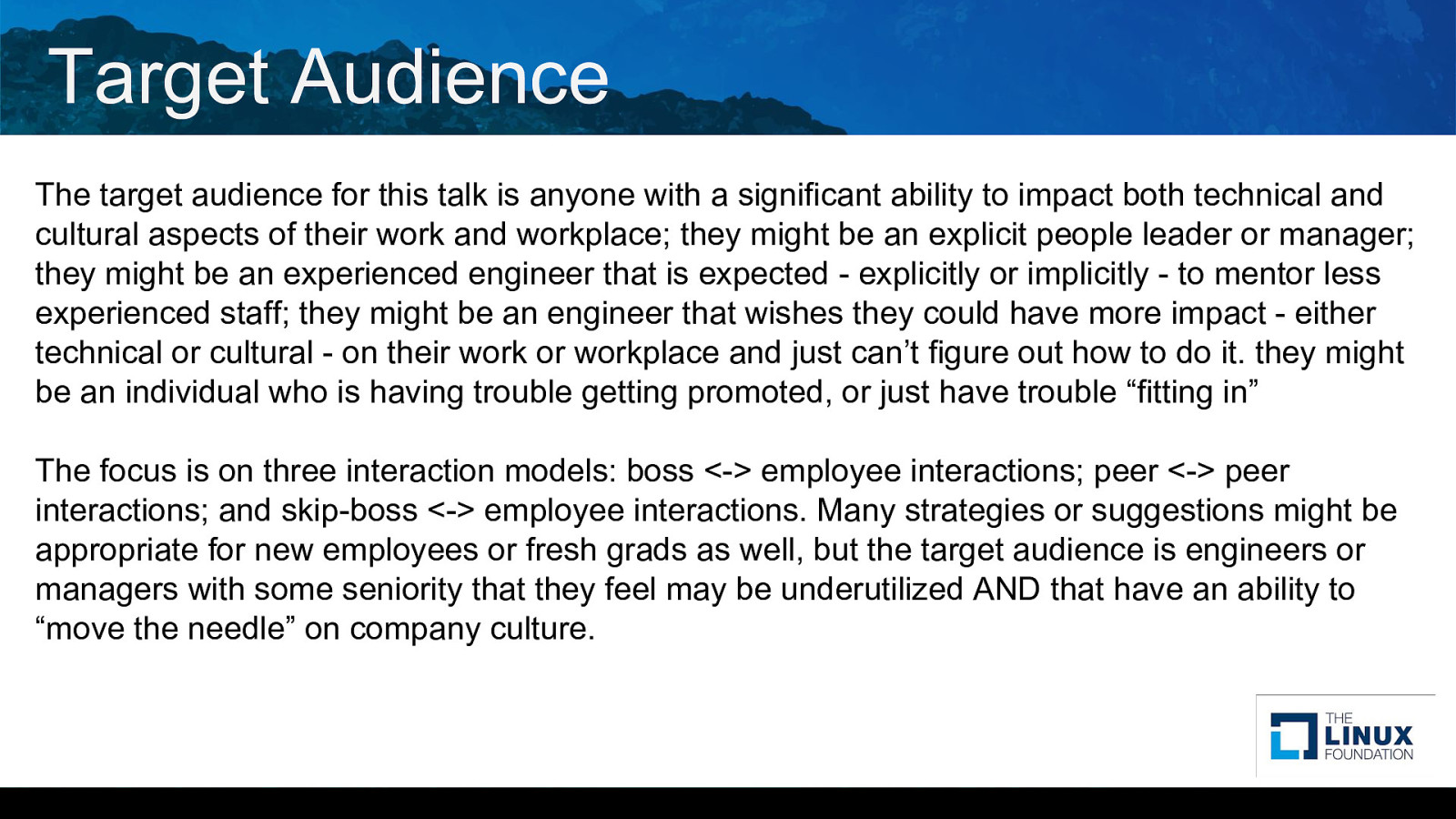
Target Audience The target audience for this talk is anyone with a significant ability to impact both technical and cultural aspects of their work and workplace; they might be an explicit people leader or manager; they might be an experienced engineer that is expected - explicitly or implicitly - to mentor less experienced staff; they might be an engineer that wishes they could have more impact - either technical or cultural - on their work or workplace and just can’t figure out how to do it. they might be an individual who is having trouble getting promoted, or just have trouble “fitting in” The focus is on three interaction models: boss <-> employee interactions; peer <-> peer interactions; and skip-boss <-> employee interactions. Many strategies or suggestions might be appropriate for new employees or fresh grads as well, but the target audience is engineers or managers with some seniority that they feel may be underutilized AND that have an ability to “move the needle” on company culture.